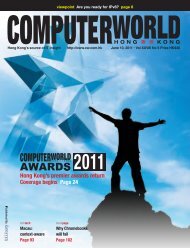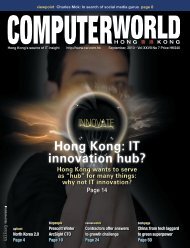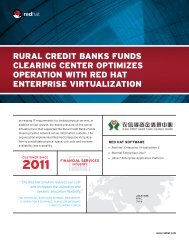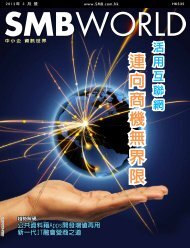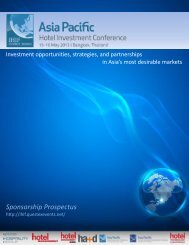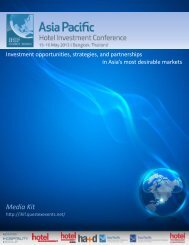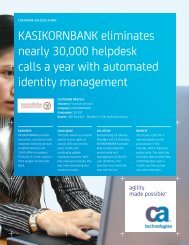Hong Kong Computer Society - enterpriseinnovation.net
Hong Kong Computer Society - enterpriseinnovation.net
Hong Kong Computer Society - enterpriseinnovation.net
You also want an ePaper? Increase the reach of your titles
YUMPU automatically turns print PDFs into web optimized ePapers that Google loves.
apidly escalated and the bank upgraded<br />
its computers to S/360 40s, then to S/370<br />
145 units.<br />
HSBC owned a controlling interest in<br />
Hang Seng Bank and the computer systems<br />
we developed were used in both<br />
banks. A vivid memory of the 1970s was<br />
the annual snake dinners hosted by Hang<br />
Seng Bank at their headquarters. Senior<br />
bank staffs were expected to attend these<br />
dinners for their customers every night<br />
for the better part of the month before<br />
Lunar New Year.<br />
CWHK: Did your bank experience ever<br />
converge with HKCS duties?<br />
CWHK: What was the view of education-<br />
al institutions tution<br />
towards IT?<br />
<strong>Kong</strong>. Leaving aside stock market collapses,<br />
the economy climbed ever wards and wealth creation was enor-<br />
upmous.<br />
Confidence was buoyant and the<br />
resistance to new ideas and new ways of<br />
doing business negligible. We just got<br />
on with it and did it, care less of the risk<br />
of failure.<br />
A vivid memory of the 1970s was the annual<br />
snake dinners hosted by Hang Seng Bank at their<br />
headquarters<br />
— John Strickland<br />
JS: In 1972 I was elected Treasurer of<br />
HKCS. I kept the accounts on punched<br />
cards, but had little awareness of accounting<br />
standards. In any event I managed<br />
to persuade Carlye Tsui, the HKCS<br />
Honorary Auditor that year, that everything<br />
was in order at the end of the year.<br />
She succeeded me as Treasurer the following<br />
year and I moved on to be Vice<br />
President. Carlye is now Chief Executive<br />
of the <strong>Hong</strong> <strong>Kong</strong> Institute of Directors<br />
and has held many public service positions<br />
contributing to the community during<br />
her career.<br />
JS: The only tertiary ti institution in the<br />
1970s that paid much attention to computer<br />
science education was the <strong>Hong</strong><br />
<strong>Kong</strong> Polytechnic. I joined the Computing<br />
Studies Advisory Committee in<br />
1973, under the auspices of Con Conway,<br />
husband of Carlye Tsui and one of<br />
the grand old men of <strong>Hong</strong> <strong>Kong</strong> computing.<br />
Vir Gulati then headed up the<br />
department. He was later succeeded by<br />
Graham Mead who made a significant<br />
contribution to training the next generation<br />
of <strong>Hong</strong> <strong>Kong</strong>’s programmers and<br />
systems analysts.<br />
CWHK: Can you cite the biggest differences<br />
from working in IT in the 70s and<br />
80s versus today?<br />
JS: The 1970s were a hugely exciting<br />
time to be in the IT profession in <strong>Hong</strong><br />
Of course there have been significant<br />
changes—in the 80s and 90s IT was<br />
seen as a very attractive career path<br />
whereas now it is not. The times were<br />
so different, we were nose-deep in the<br />
technology, we understood in detail the<br />
machinery we were using, whereas today<br />
you sit down in front of a PC and<br />
there are so many layers between you<br />
and the computer—it’s much more<br />
complex today.<br />
Today if there is a problem to solve,<br />
you reach for the software package<br />
whereas we’d start pulling cables and<br />
opening up boxes. 3<br />
www.cw.com.hk<br />
Nov 2009 <strong>Computer</strong>world <strong>Hong</strong> <strong>Kong</strong> 21




